Aaon RQ-002 Installation Manual
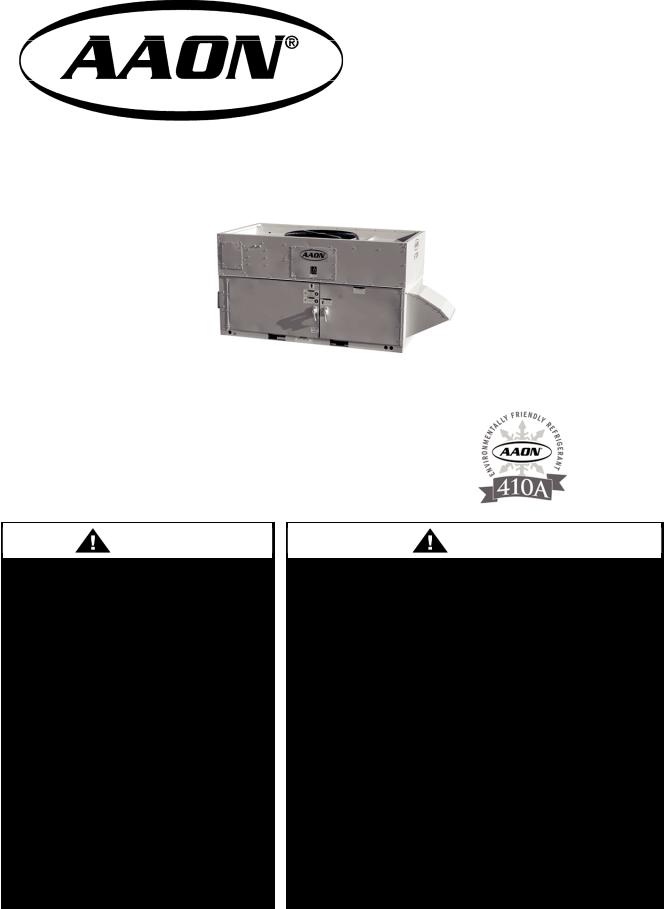
RQ SERIES
Packaged Rooftop Units, Heat Pumps,
& Outdoor Air Handling Units
Installation, Operation,
 & Maintenance
& Maintenance
WARNING
FIRE OR EXPLOSION HAZARD
Failure to follow safety warnings exactly could result in serious injury, death or property damage.
Be sure to read and understand the installation, operation and service instructions in this manual.
Improper installation, adjustment, alteration, service or maintenance can cause serious injury, death or property damage.
A copy of this IOM should be kept with the unit.
WARNING
oDo not store gasoline or other flammable vapors and liquids in the vicinity of this or any other appliance
oWHAT TO DO IF YOU SMELL GAS
Do not try to light any appliance.
Do not touch any electrical switch; do not use any phone in your building.
Leave the building immediately.
Immediately call your gas supplier from a phone remote from the building. Follow the gas supplier’s instructions.
If you cannot reach your gas supplier, call the fire department.
oStartup and service must be performed by a
Factory Trained Service Technician.
Table of Contents |
|
AAON® RQ Series Features and Options Introduction................................................................. |
7 |
Safety .............................................................................................................................................. |
8 |
RQ Series Feature String Nomenclature....................................................................................... |
13 |
General Information...................................................................................................................... |
20 |
Codes and Ordinances .............................................................................................................. |
20 |
Receiving Unit .......................................................................................................................... |
21 |
Packaged Direct Expansion (DX) Units ................................................................................... |
22 |
Gas or Electric Heating............................................................................................................. |
23 |
Wiring Diagrams....................................................................................................................... |
24 |
Condensate Drain Pan............................................................................................................... |
24 |
Installation..................................................................................................................................... |
25 |
Unit Location ............................................................................................................................ |
25 |
Setting the Curb ........................................................................................................................ |
25 |
Forklifting the Unit ................................................................................................................... |
28 |
Lifting the Unit ......................................................................................................................... |
29 |
Vertical Duct Connection ......................................................................................................... |
30 |
Seismic Curb Installation.......................................................................................................... |
31 |
Horizontal Duct Connection ..................................................................................................... |
33 |
Outside Air Rain Hood ............................................................................................................. |
33 |
Metal Mesh Filters.................................................................................................................... |
34 |
Electrical ................................................................................................................................... |
35 |
Thermostat Control Wiring................................................................................................... |
37 |
Gas Heating............................................................................................................................... |
37 |
Maximum Piping Capacities................................................................................................. |
38 |
Piping Sizing Examples ........................................................................................................ |
38 |
Inlet and Manifold Pressures ................................................................................................ |
39 |
Gas Pressure Regulator & Overpressure Protection Device................................................. |
39 |
Additional Gas Piping Considerations.................................................................................. |
40 |
Leak Testing.......................................................................................................................... |
41 |
Refrigerant-to-Water Heat Exchanger ...................................................................................... |
41 |
Water-Source Heat Pump Applications ................................................................................ |
41 |
Open Loop Applications ....................................................................................................... |
42 |
Freezing Water in the Heat Exchanger ................................................................................. |
42 |
Water Piping ......................................................................................................................... |
43 |
Condensate Drain Piping .......................................................................................................... |
45 |
Discharge and Suction Line Piping .......................................................................................... |
45 |
Heating Coils ............................................................................................................................ |
48 |
Chilled Water Coil .................................................................................................................... |
48 |
Electric Preheat ......................................................................................................................... |
49 |
Status Display Screens.......................................................................................................... |
49 |
System Setting Screens ......................................................................................................... |
50 |
LED Flash Alarm Codes....................................................................................................... |
52 |
Operation............................................................................................................................... |
52 |
Energy Recovery Units............................................................................................................. |
53 |
Startup........................................................................................................................................... |
61 |
|
3 |
Filters ........................................................................................................................................ |
61 |
Adjusting Refrigerant Charge................................................................................................... |
61 |
Checking Liquid Sub-Cooling .............................................................................................. |
62 |
Checking Evaporator Superheat ........................................................................................... |
62 |
Adjusting Sub-Cooling and Superheat Temperatures........................................................... |
62 |
Gas Heater Instructions............................................................................................................. |
64 |
Freeze Stat Startup.................................................................................................................... |
65 |
Supply Fan EC Motor Startup .................................................................................................. |
65 |
Condenser Fan EC Motor Startup............................................................................................. |
66 |
Adjustable Fan Cycling Switch Procedure ............................................................................... |
69 |
Operation....................................................................................................................................... |
71 |
Thermostat Operation ............................................................................................................... |
71 |
Packaged DX Cooling Operation and Control ......................................................................... |
71 |
Gas Heater Operation................................................................................................................ |
71 |
Electric Heating Operation ....................................................................................................... |
72 |
Steam or Hot Water Preheating and Heating Operation........................................................... |
72 |
Modulating Electric Preheat ..................................................................................................... |
72 |
Chilled Water or Non-Compressorized DX Cooling Operation............................................... |
72 |
Maintenance.................................................................................................................................. |
73 |
Gas Heating............................................................................................................................... |
73 |
Gas Heat Exchanger Removal .................................................................................................. |
74 |
DX Cooling............................................................................................................................... |
74 |
Condenser Fan .......................................................................................................................... |
74 |
Condensate Drain Pans ............................................................................................................. |
75 |
Evaporator Coil......................................................................................................................... |
75 |
E-Coated Coil Cleaning ............................................................................................................ |
76 |
Microchannel Coil Cleaning..................................................................................................... |
77 |
Supply Fan ................................................................................................................................ |
79 |
Phase and Brownout Protection Module .................................................................................. |
81 |
Variable Capacity Compressor Controller................................................................................ |
83 |
Filter Replacement.................................................................................................................... |
84 |
Replacement Parts..................................................................................................................... |
85 |
Appendix A - Heat Exchanger Corrosion Resistance................................................................... |
86 |
Appendix B - Thermistor Temperature vs. Resistance Values..................................................... |
88 |
RQ Series Startup Form................................................................................................................ |
89 |
Maintenance Log .......................................................................................................................... |
93 |
Literature Change History............................................................................................................. |
94 |
R94490 · Rev. E · 160506 |
|
4
Index of Tables and Figures |
|
Tables: |
|
Table 1 - Electric and Gas Heating Capacities ............................................................................. |
23 |
Table 2 - Auxiliary Electric Heating Capacities ........................................................................... |
24 |
Table 3 - Unit Clearances ............................................................................................................. |
25 |
Table 4 - Control Wiring............................................................................................................... |
37 |
Table 5 - 2-6 ton Gas Connections ............................................................................................... |
38 |
Table 6 - Natural Gas (ft3/hr) ........................................................................................................ |
38 |
Table 7 - Propane (kBtu/hr) .......................................................................................................... |
38 |
Table 8 - Gas Piping Supports ...................................................................................................... |
39 |
Table 9 - Glycol Freezing Points .................................................................................................. |
43 |
Table 10 - Condenser Water Connections .................................................................................... |
43 |
Table 11 - Hot Water Coil Connection Sizes................................................................................ |
48 |
Table 12 - Steam Coil Connection Sizes ...................................................................................... |
48 |
Table 13 - Chilled Water Coil Connection Sizes.......................................................................... |
48 |
Table 14 - Stages of Electric Preheat............................................................................................ |
51 |
Table 15 - Acceptable Refrigeration Circuit Values..................................................................... |
62 |
Table 16 - R-410A Refrigerant Temperature-Pressure Chart....................................................... |
63 |
Table 17 - EC Condenser Fan Cycling Options............................................................................ |
68 |
Table 18 - Demand Signal vs. Compressor Capacity Modulation................................................ |
83 |
Table 19 - RQ Series 2-6 ton Pre Filters....................................................................................... |
84 |
Table 20 - RQ Series 2-6 ton Unit Filters..................................................................................... |
85 |
Table 21 - RQ Series 2-6 ton Energy Recovery Wheel Filters..................................................... |
85 |
5
Figures: |
|
Figure 1 - Lockable Handle .......................................................................................................... |
21 |
Figure 2 - RQ Series Orientation .................................................................................................. |
25 |
Figure 3 - RQ Cabinet Standard and Power Exhaust Gasket Locations....................................... |
27 |
Figure 4 - Forklifting an RQ Series Unit from the Side ............................................................... |
28 |
Figure 5 - Forklifting an RQ Series Unit from the Front.............................................................. |
28 |
Figure 6 - Lifting Details of a 2-6 ton Standard or Power Exhaust Unit...................................... |
29 |
Figure 7 - Lifting Details of a 2-6 ton Energy Recovery Wheel Unit .......................................... |
29 |
Figure 8 - Vertical Duct Connection............................................................................................. |
30 |
Figure 9 - Solid Bottom Seismic Curb with Filters ...................................................................... |
31 |
Figure 10 - Seismic Solid Bottom Curb without Filters Cross Section ........................................ |
32 |
Figure 11 - Seismic Solid Bottom Curb without Filters Detail A................................................. |
32 |
Figure 12 - Seismic Solid Bottom Curb without Filters Detail B................................................. |
32 |
Figure 13 - Seismic Rigid Mount Curb Cross Section ................................................................. |
33 |
Figure 14 - Horizontal duct connections....................................................................................... |
33 |
Figure 15 - RQ Series unit Closed Rain Hood.............................................................................. |
34 |
Figure 16 - RQ Series unit Open Rain Hood ................................................................................ |
34 |
Figure 17 - Rain Hood with Metal Mesh Filter Rack Installation ................................................ |
34 |
Figure 18 - Unit Base Utility Entry............................................................................................... |
35 |
Figure 19 - Back View of Power Switch from Control Compartment ......................................... |
35 |
Figure 20 - RQ Series Gas Heat Exchanger.................................................................................. |
38 |
Figure 21 - Example 2-6 ton through the Base Gas Piping .......................................................... |
40 |
Figure 22 - Post Corner Hole Location......................................................................................... |
46 |
Figure 23 - Post Back Hole Location............................................................................................ |
46 |
Figure 24 - Post Corner Hole Piping............................................................................................. |
47 |
Figure 25 - Post Back Hole Piping ............................................................................................... |
47 |
Figure 26 - Preheat Controller ...................................................................................................... |
49 |
Figure 27 - Gas Heater Instructions.............................................................................................. |
64 |
Figure 28 - PIN Connectors on EC Supply Fan Motor Electronics.............................................. |
65 |
Figure 29 - Gas Heat Exchanger................................................................................................... |
74 |
Figure 30 - Removal of a Condenser Fan Assembly .................................................................... |
75 |
Figure 31 - Evaporator Coil Access.............................................................................................. |
75 |
Figure 32 - 2-6 ton Supply Fan..................................................................................................... |
80 |
Figure 33 - RQ Supply Fan Removal Bolts.................................................................................. |
80 |
Figure 34 - RQ Supply Fan Removal Slide .................................................................................. |
80 |
Figure 35 - Variable Capacity Compressor Controller................................................................. |
83 |
Figure 36 - Compressor Controller Flash Code Details................................................................ |
84 |
Figure 37 - RQ Series 2-6 ton Standard Filter Layout.................................................................. |
85 |
6
AAON® RQ Series Features and Options Introduction
Energy Efficiency
•Direct Drive Backward Curved Plenum Supply Fans
•Variable Capacity R-410A Scroll Compressors
•Airside Economizers
•Factory Installed AAONAIRE® Energy Recovery Wheels
•Double Wall Rigid Polyurethane Foam Panel Construction, R-13 Insulation
•Modulating Natural Gas Heaters
•Modulating/SCR Electric Heaters
•Premium Efficiency Motors
•Variable Speed Supply/ Exhaust Fans
•Air-Source, Water-Source and Geothermal Heat Pumps
Indoor Air Quality
•100% Outside Air
•Constant Volume Outside Air Control
•Economizer CO2 Override
•High Efficiency Filtration
•Double Wall Rigid Polyurethane Foam Panel Construction, R-13 Insulation
•Interior Corrosion Protection
Humidity Control
•High Capacity Cooling Coils
•Variable Capacity Compressors
•Factory Installed AAONAIRE Total Energy Recovery Wheels
•Modulating Hot Gas Reheat
Safety
•Burglar Bars
•Freeze Stats
•Hot Water/Steam Preheat Coils
•Electric Preheat
•Phase and Brown Out Protection
•Supply/Return Smoke Detectors
•Supply/Return Firestats
Installation and Maintenance
•Clogged Filter Switch
•Color Coded Wiring Diagram
•Compressors in Isolated Compartment
•Compressor Isolation Valves
•Convenience Outlet
•Direct Drive Supply Fans
•Hinged Access Doors with Lockable Handles
•Magnehelic Gauge
•Service Lights
•Sight Glass
System Integration
•Chilled Water Cooling Coils
•Controls by Others
•Electric/Natural Gas/LP Heating
•Hot Water/Steam Heating Coil
•Non-Compressorized DX Coils
Environmentally Friendly
•Airside Economizers
•Factory Installed AAONAIRE Energy Recovery Wheels
•R-410A Refrigerant
Extended Life
•5 Year Compressor Warranty
•15 Year Aluminized Steel Heat Exchanger Warranty
•25 Year Stainless Steel Heat Exchanger Warranty
•Interior Corrosion Protection
•Polymer E-Coated Coils - 5 Year Warranty
•Stainless Steel Coil Casing
•Stainless Steel Drain Pans
7

Safety
Attention should be paid to the following statements:
NOTE - Notes are intended to clarify the unit installation, operation and maintenance.
 CAUTION - Caution statements are given to prevent actions that may result in equipment damage, property damage, or personal injury.
CAUTION - Caution statements are given to prevent actions that may result in equipment damage, property damage, or personal injury.
 WARNING - Warning statements are given to prevent actions that could result in equipment damage, property damage, personal injury or death.
WARNING - Warning statements are given to prevent actions that could result in equipment damage, property damage, personal injury or death.
 DANGER - Danger statements are given to prevent actions that will result in equipment damage, property damage, severe personal injury or death.
DANGER - Danger statements are given to prevent actions that will result in equipment damage, property damage, severe personal injury or death.
WARNING
ELECTRIC SHOCK, FIRE OR
EXPLOSION HAZARD
Failure to follow safety warnings exactly could result in dangerous operation, serious injury, death or property damage.
Improper servicing could result in dangerous operation, serious injury, death or property damage.
Before servicing, disconnect all electrical power to the furnace. More than one disconnect may be provided.
When servicing controls, label all wires prior to disconnecting.
Reconnect wires correctly.
Verify proper operation after servicing. Secure all doors with key-lock or nut and bolt.
CAUTION
WHAT TO DO IF YOU SMELL GAS
Do not try to turn on unit.
Shut off main gas supply.
Do not touch any electric switch.
Do not use any phone in the building.
Never test for gas leaks with an open flame.
Use a gas detection soap solution and check all gas connections and shut off valves.
WARNING
Electric shock hazard. Before servicing, shut off all electrical power to the unit, including remote disconnects, to avoid shock hazard or injury from rotating parts. Follow proper Lockout-Tagout procedures.
8
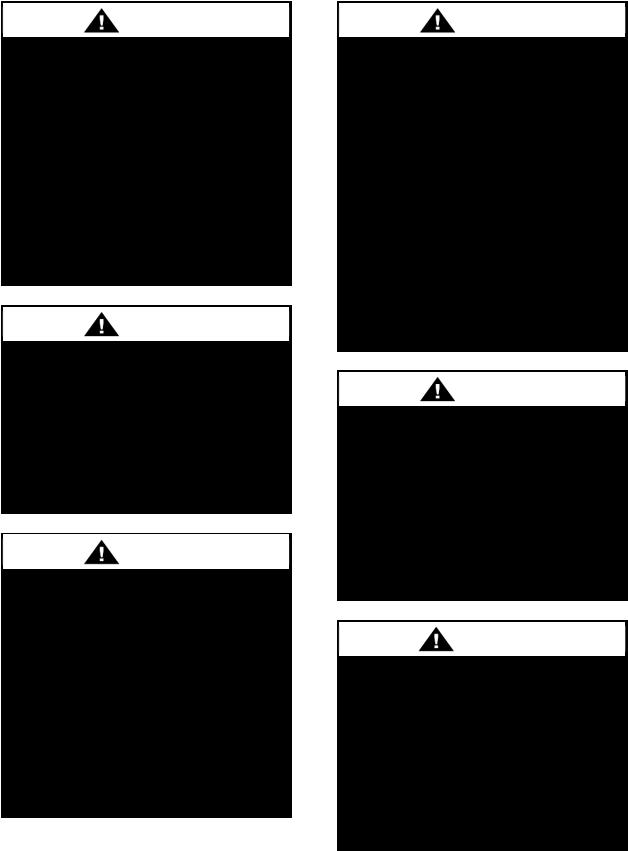
WARNING
FIRE, EXPLOSION OR CARBON MONOXIDE POISONING HAZARD
Failure to replace proper controls could result in fire, explosion or carbon monoxide poisoning. Failure to follow safety warnings exactly could result in serious injury, death or property damage. Do not store or use gasoline or other flammable vapors and liquids in the vicinity of this appliance.
WARNING
ROTATING COMPONENTS
Unit contains fans with moving parts that can cause serious injury. Do not open door containing fans until the power to the unit has been disconnected and fan wheel has stopped rotating.
WARNING
GROUNDING REQUIRED
All field installed wiring must be completed by qualified personnel.
Field installed wiring must comply with NEC/CEC, local and state electrical code requirements. Failure to follow code requirements could result in serious injury or death.
Provide proper unit ground in accordance with these code requirements.
WARNING
During installation, testing, servicing and troubleshooting of the equipment it may be necessary to work with live electrical components. Only a qualified licensed electrician or individual properly trained in handling live electrical components shall perform these tasks.
Standard NFPA-70E, an OSHA regulation requiring an Arc Flash Boundary to be field established and marked for identification of where appropriate Personal Protective Equipment (PPE) be worn, should be followed.
WARNING
VARIABLE FREQUENCY DRIVES
Do not leave VFDs unattended in hand mode or manual bypass.
Damage to personnel or equipment can occur if left unattended. When in hand mode or manual bypass mode VFDs will not respond to controls or alarms.
CAUTION
Electric motor over-current protection and overload protection may be a function of the Variable Frequency
Drive to which the motors are wired. Never defeat the VFD motor overload feature. The overload ampere setting must not exceed 115% of the electric motors FLA rating as shown on the motor nameplate.
9
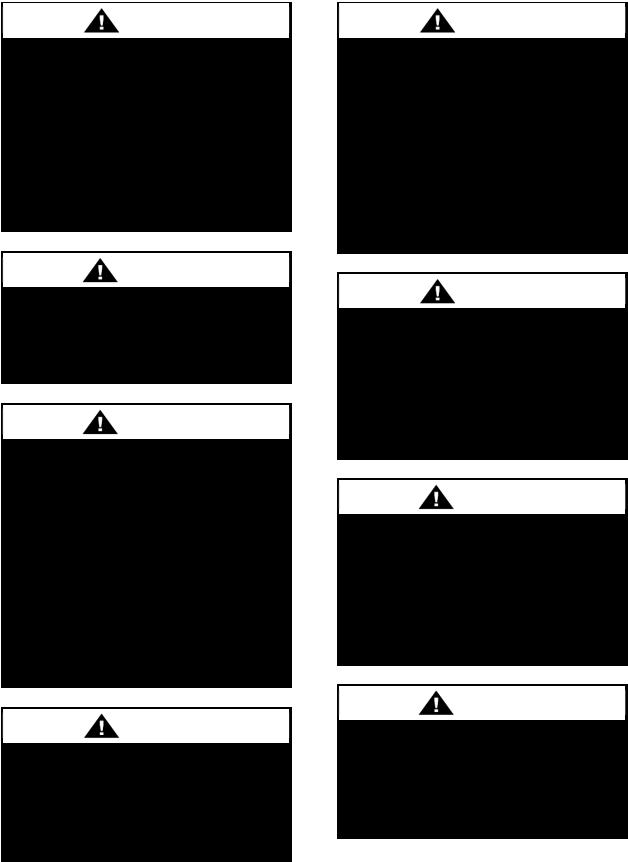
WARNING
UNIT HANDLING
To prevent injury or death lifting equipment capacity shall exceed unit weight by an adequate safety factor. Always test-lift unit not more than 24 inches high to verify proper center of gravity lift point to avoid unit damage, injury or death.
CAUTION
Failure to properly drain and vent coils when not in use during freezing temperature may result in coil and equipment damage.
CAUTION
Rotation must be checked on all
MOTORS AND COMPRESSORS of
3 phase units at startup by a qualified service technician. Scroll compressors are directional and can be damaged if rotated in the wrong direction. Compressor rotation must be checked using suction and discharge gauges. Fan motor rotation should be checked for proper operation. Alterations should only be made at the unit power connection
WARNING
Do not use oxygen, acetylene or air in place of refrigerant and dry nitrogen for leak testing. A violent explosion may result causing injury or death.
WARNING
WATER PRESSURE
Prior to connection of condensing water supply, verify water pressure is less than maximum pressure shown on unit nameplate. To prevent injury or death due to instantaneous release of high pressure water, relief valves should be field supplied on system water piping.
WARNING
Always use a pressure regulator, valves and gauges to control incoming pressures when pressure testing a system. Excessive pressure may cause line ruptures, equipment damage or an explosion which may result in injury or death.
CAUTION
To prevent damage to the unit, do not use acidic chemical coil cleaners. Do not use alkaline chemical coil cleaners with a pH value greater than 8.5, after mixing, without first using an aluminum corrosion inhibitor in the cleaning solution.
CAUTION
Do not clean DX refrigerant coils with hot water or steam. The use of hot water or steam on refrigerant coils will cause high pressure inside the coil tubing and damage to the coil.
10
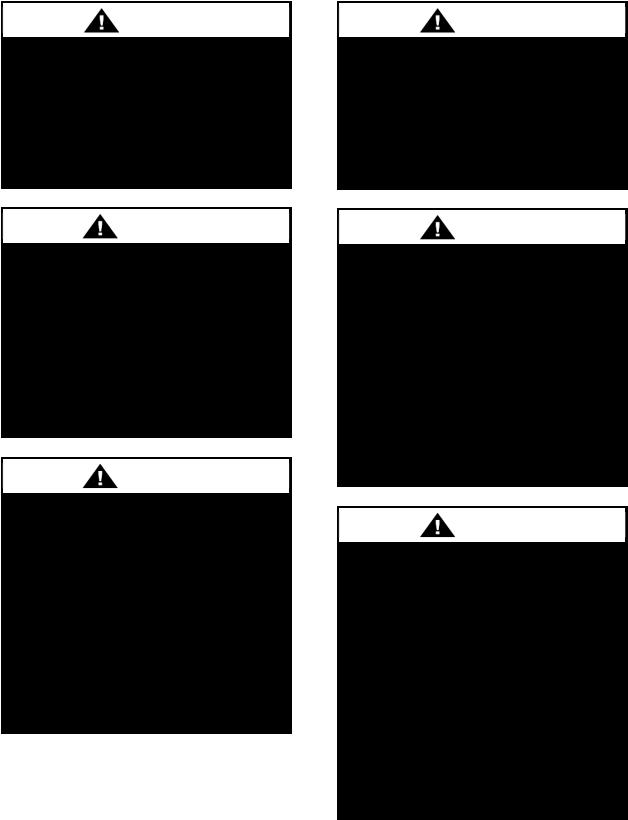
WARNING
Some chemical coil cleaning compounds are caustic or toxic. Use these substances only in accordance with the manufacturer’s usage instructions. Failure to follow instructions may result in equipment damage, injury or death.
CAUTION
Door compartments containing hazardous voltage or rotating parts are equipped with door latches to allow locks. Door latch are shipped with nut and bolts requiring tooled access. If you do not replace the shipping hardware with a pad lock always re-install the nut & bolt after closing the door.
CAUTION
Cleaning the cooling tower or condenser water loop with harsh chemicals such as hydrochloric acid (muriatic acid), chlorine or other chlorides, can damage the refrigerant-to-water heat exchanger. Care should be taken to avoid allowing chemicals to enter the refrigerant-to-water heat exchanger.
See Appendix A - Heat Exchanger Corrosion Resistance for more information.
WARNING
OPEN LOOP APPLICATIONS
Failure of the condenser as a result of chemical corrosion is excluded from coverage under AAON Inc. warranties and the heat exchanger manufacturer’s warranties.
WARNING
WATER FREEZING
Failure of the condenser due to freezing will allow water to enter the refrigerant circuit and will cause extensive damage to the refrigerant circuit components. Any damage to the equipment as a result of water freezing in the condenser is excluded from coverage under AAON warranties and the heat exchanger manufacturer warranties.
WARNING
COMPRESSOR CYCLING
5 MINUTE MINIMUM OFF TIME
To prevent motor overheating compressors must cycle off for a minimum of 5 minutes.
5 MINUTE MINIMUM ON TIME To maintain the proper oil level compressors must cycle on for a minimum of 5 minutes.
The cycle rate must not exceed 6 starts per hour.
11
1.Startup and service must be performed by a Factory Trained Service Technician.
2.Use only with type of the gas approved for the furnace. Refer to the furnace rating plate.
3.The unit is for outdoor use only. See General Information section for more information.
4.Provide adequate combustion ventilation air to the furnace. If a vent duct extension is used, a class III approved vent is required. See the Locating Units and Gas Heating sections of the Installation section of the manual.
5.Always install and operate furnace within the intended temperature rise range and duct system external static pressure (ESP) as specified on the unit nameplate.
6.The supply and return air ducts must be derived from the same space. It is recommended ducts be provided with access panels to allow inspection for duct tightness. When a down flow duct is used with electric heat, the exhaust duct should be an L shaped duct.
7.Clean furnace, duct and components upon completion of the construction setup. Verify furnace operating conditions including input rate, temperature rise and ESP.
8.Every unit has a unique equipment nameplate with electrical, operational, and unit clearance specifications. Always refer to the unit nameplate for specific ratings unique to the model you have purchased.
9.READ THE ENTIRE INSTALLATION, OPERATION AND MAINTENANCE MANUAL. OTHER IMPORTANT SAFETY PRECAUTIONS ARE PROVIDED THROUGHOUT THIS MANUAL.
10.Keep this manual and all literature safeguarded near or on the unit.
12
RQ Series Feature String Nomenclature
|
|
Model Options |
: |
|
|
Unit Feature Options |
|
|
GEN |
SIZE |
VLT CONFIG A1 A2 A3 A4 B1 B2 B3 |
1A 1B 1C 1D |
2 3 4 |
5A 5B 5C |
6A 6B 6C 7 8 9 10 11 12 13 |
14A 14B |
15 16 17 18 19 20 21 22 23 |
R Q - 0 0 5 - 3 - V - B B 0 1 - 3 3 4 : A 0 0 0 - D 0 B - P J C - 0 B A - 0 D 0 0 0 0 L - 0 0 - 0 0 B 0 0 0 0 0 B
BASE MODEL
SERIES AND GENERATION
RQ
UNIT SIZE
002 = 2 ton Capacity
003 = 3 ton Capacity
004 = 4 ton Capacity
005 = 5 ton Capacity
006 = 6 ton Capacity
VOLTAGE
1 = 230V/1Φ/60Hz
2 = 230V/3Φ/60Hz
3 = 460V/3Φ/60Hz
4 = 575V/3Φ/60Hz
6 = 380V/3Φ/50Hz
8 = 208V/3Φ/60Hz
9 = 208V/1Φ/60Hz
DISCHARGE/RETURN CONFIGURATION AND INTERIOR CORROSION PROTECTION
V = Vertical Discharge and Return H = Horizontal Discharge and Return
J = Option H + Interior Corrosion Protection W = Option V + Interior Corrosion Protection K = Vertical Discharge and Horizontal Return L = Option K + Interior Corrosion Protection M = Horizontal Discharge and Vertical Return N = Option M + Interior Corrosion Protection
Model Option A: COOLING/HEAT
PUMP
A1: REFRIGERANT STYLE
0 = Air Handling Unit
B = R-410A - Non-Compressorized DX Air Handling
Unit
C = R-410A - Standard Efficiency
E = R-410A Variable Capacity Scroll Compressor -
High Efficiency
F = R-410A Variable Capacity Scroll Compressor -
Standard Efficiency
G= R-410A Two-Step Compressor - High Efficiency
H= R-410A Two-Step Compressor - Standard Efficiency
A2: UNIT CONFIGURATION
0 = No Cooling
A = Air-Cooled Cond. + Std Evap. Coil
B = Air-Cooled Cond. + 6 Row Evap. Coil J = Water-Cooled Cond. + Std Evap. Coil
K = Water-Cooled Cond. + 6 Row Evap. Coil U = Chilled Water Coil - 4 Row
W = Chilled Water Coil - 6 Row
2 = Non-Compressorized + Std Evap. Coil
4 = Non-Compressorized + 6 Row Evap. Coil 6 = Air-Source Heat Pump
7 = Water-Source/Geothermal Heat Pump
A3: COIL COATING
0 = Standard
1 = Polymer E-Coated Evap. and Cond. Coils 8 = Polymer E-Coated Cond. Coil
9 = Polymer E-Coated Cooling Coil
A = Stainless Steel Evap. Coil Casing + Polymer E- Coated Cond. Coil
D = Stainless Steel Cooling Coil Casing
A4: COOLING/HEAT PUMP STAGING
0 = No Cooling
1 = 1 Stage
2 = 2 Stage
9 = Modulating - Lead VCC
B = 1 Stage + 1 Stage Auxiliary Heat
C = 2 Stage + 1 Stage Auxiliary Heat
E = Modulating - Lead VCC + 1 Stage Aux. Heat H = Single Serpentine 8 fpi
J = Half Serpentine 8 fpi
K = Single Serpentine 10 fpi L = Half Serpentine 10 fpi M = Single Serpentine 12 fpi N = Half Serpentine 12 fpi
P = 1 Stage + 2 Stage Auxiliary Heat
Q = 2 Stage + 2 Stage Auxiliary Heat
S = Modulating - Lead VCC + 2 Stage Aux. Heat U = 1 Stage + 4 Stage Auxiliary Heat
V = 2 Stage + 4 Stage Auxiliary Heat
Y = Modulating - Lead VCC + 4 Stage Aux. Heat
13
RQ Series Feature String Nomenclature
|
|
Model Options |
: |
|
|
|
Unit Feature Options |
|
|
GEN |
SIZE |
VLT CONFIG A1 A2 A3 A4 |
B1 B2 B3 |
1A 1B 1C 1D |
2 3 4 |
5A 5B 5C |
6A 6B 6C 7 8 9 10 11 12 13 |
14A 14B |
15 16 17 18 19 20 21 22 23 |
R Q - 0 0 5 - 3 - V - B B 0 1 - 3 3 4 : A 0 0 0 - D 0 B - P J C - 0 B A - 0 D 0 0 0 0 L - 0 0 - 0 0 B 0 0 0 0 0 B
Model Option B: HEATING
B1: HEATING TYPE
0 = No Heating
1 = Electric Heat
2 = Natural Gas Aluminized
3 = Natural Gas Stainless Steel
4 = High Altitude Natural Gas Aluminized
5 = High Altitude Natural Gas Stainless Steel
6 = LP Gas Aluminized
7 = LP Gas Stainless Steel
8 = High Altitude LP Gas Aluminized
9 = High Altitude LP Gas Stainless Steel C = Steam Distributing Standard
D = Steam Distributing Polymer E-Coated E = Hot Water Standard
F = Hot Water Polymer E-Coated
B2: HEATING DESIGNATION
0 = No Heating
1 = Heat 1
2 = Heat 2
3 = Heat 3
4 = Heat 4
5 = Heat 5
7 = Heat 7
H = 1 Row Coil
J = 2 Row Coil
B3: HEATING STAGING
0 = No Heating
1 = 1 Stage
2 = 2 Stage
3 = 3 Stage
4 = 4 Stage
9 = Modulating Gas/SCR Electric
A = SCR Electric, 0-10V External Control H = Single Serpentine 8 fpi
J = Half Serpentine 8 fpi
M = Single Serpentine 12 fpi N = Half Serpentine 12 fpi
Feature 1: RETURN/OUTSIDE AIR
1A: RETURN/OUTSIDE AIR SECTION
0 = Manually Adjustable OA Opening + RA Opening A = Economizer
B = Econ + Power Exhaust
F = Low cfm Total Energy Recovery Wheel G = Low cfm Total ERW + Bypass Damper H = Low cfm Sensible ERW
J = Low cfm Sensible ERW + Bypass Damper K = 100% Outside Air - No Return Air Opening
L = Motorized Outside Air Damper + RA Opening M = Motorized Outside Air Damper - No RA Opening
N = Empty ERW Option BoxNo Power Exhaust P = Empty ERW Option Box + Power Exhaust
5 = 100% Return Air
1B: RETURN/EXHAUST AIR BLOWER CONFIGURATION
0 = Standard – None
A = 1 Blower + Standard Eff. Motor
C = 1 Blower + Premium Eff. Motor
E = 1 Blower + Premium Eff. Motor + 1 VFD H = 1 Blower + High Efficiency EC Motor
J = 1 Blower + Single Phase Motor + Speed Control
1C: RETURN/EXHAUST AIR BLOWER
0 = Standard - None
B = 15” Backward Curved Plenum
J = 15” Backward Curved Plenum - 70% Width
N= 16” Axial Flow
1D: RETURN/EXHAUST AIR BLOWER MOTOR
0 = Standard - None A = 0.25 hp - 850 rpm B = 0.5 hp - 1075 rpm C = 1 hp - 1750 rpm D = 2 hp - 1760 rpm
W = 0.75 hp - 1760 rpm Z = 0.167 hp - 825 rpm
14
RQ Series Feature String Nomenclature
|
|
Model Options |
: |
Unit Feature Options |
GEN |
SIZE |
VLT CONFIG A1 A2 A3 A4 B1 B2 B3 |
1A 1B 1C 1D 2 3 4 |
5A 5B 5C 6A 6B 6C 7 8 9 10 11 12 13 14A 14B 15 16 17 18 19 20 21 22 23 |
R Q - 0 0 5 - 3 - V - B B 0 1 - 3 3 4 : A 0 0 0 - D 0 B - P J C - 0 B A - 0 D 0 0 0 0 L - 0 0 - 0 0 B 0 0 0 0 0 B |
||||
Feature 2: OUTSIDE AIR CONTROL |
Feature 5: SUPPLY AIR OPTIONS |
|||
0 = Standard - None |
|
5A: SUPPLY AIR BLOWER CONFIGURATION |
||
A = 3 Position Actuator - Sensible Limit |
P = 1 Blower + High Efficiency EC Motor |
|||
B = 3 Position Actuator - Enthalpy Limit |
Q = 1 Blower + Inverter Rated Motor + 1 VFD |
|||
C = Fully Modulating Actuator - Sensible Limit |
R = 1 Blower + Single Phase Motor + Speed Control |
|||
D = Fully Modulating Actuator - Enthalpy Limit |
5B: SUPPLY AIR BLOWER |
|||
E = DDC Actuator |
|
|||
M = 3 Pos. Act. - Sensible Limit + CO2 Override |
J = 18.5” Direct Drive Backward Curved Plenum |
|||
N = 3 Pos. Act. - Enthalpy Limit + CO2 Override |
K = 18.5” Direct Drive BC Plenum - 60% Width |
|||
P = Fully Mod. Act. - Sensible + CO2 Override |
5C: SUPPLY AIR BLOWER MOTOR |
|||
Q = Fully Mod. Act. - Enthalpy + CO2 Override |
||||
R = DDC Actuator + CO2 Override |
|
A = 0.25 hp - 850 rpm |
||
S = Dual Minimum Position Potentiometers + Fully |
B = 0.5 hp - 1075 rpm |
|||
Mod. Act. - Sensible Limit |
|
C = 1 hp - 1750 rpm |
||
T = Dual Minimum Position Potentiometers + Fully |
D = 2 hp - 1760 rpm |
|||
Mod. Act. - Enthalpy Limit |
|
W = 0.75 hp - 1760 rpm |
||
U = 2 Position Actuator |
|
Z = 0.167 hp - 825 rpm |
||
Feature 3: HEAT OPTIONS |
|
Feature 6: FILTERS |
||
0 = Standard - None |
|
6A: PRE FILTER |
||
E = Discharge Air Override |
|
0 = Standard - None |
||
K = Auxiliary Heat K |
|
A = 2” Pleated - 30% Eff. - MERV 8 |
||
L = Auxiliary Heat L |
|
B = Metal Mesh Outside Air Filter |
||
M = Auxiliary Heat M |
|
C = Lint Screen Filter |
||
N = Auxiliary Heat N |
|
D = Exhaust Air ERW Filter |
||
Feature 4: MAINTENANCE OPTIONS |
E = Option A + B |
|||
F = Option A + D |
||||
0 = Standard - None |
|
G = Option B + D |
||
A = Field Wired 115V Outlet |
|
H = Option A + B + D |
||
B = Factory Wired 115V Outlet
C = Blower Aux. Contact
D = Remote Start/Stop Terminals
E = Options A + C
F = Options A + D
G = Options B + C
H = Options B + D
J = Options A + C + D
K = Options B + C + D
L = Options C + D
15
|
|
Model Options |
|
: |
|
Unit Feature Options |
GEN |
SIZE |
VLT CONFIG A1 A2 A3 A4 |
B1 B2 B3 |
1A 1B 1C 1D |
2 3 4 |
5A 5B 5C 6A 6B 6C 7 8 9 10 11 12 13 14A 14B 15 16 17 18 19 20 21 22 23 |
R Q - 0 0 5 - 3 - V - B B 0 1 - 3 3 4 : A 0 0 0 - D 0 B - P J C - 0 B A - O D 0 0 0 0 L - 0 0 - 0 0 B 0 0 0 0 0 B |
||||||
6B: UNIT FILTER |
|
|
|
Feature 9: REFRIGERATION |
||
0 = 2” Throwaway or |
|
|
|
ACCESSORIES |
||
2” Pleated - 30% Eff. - MERV 8 |
|
|
|
|||
|
0 = Standard |
|
RQ Series Feature String Nomenclature |
||
A = 2” Pleated - 30% Eff. - MERV 8 |
A = Sight Glass |
|
B = 4” Pleated - 30% Eff. - MERV 8 |
||
B = Compressor Isolation Valves |
||
C = 2” Permanent Filter + Replaceable Media |
||
C = Options A + B |
||
F = 4” Pleated - 65% Eff. - MERV 11 |
||
D = ECM Condenser Fan - Multiple Speed |
||
G = 4” Pleated - 85% Eff. - MERV 13 |
||
E = ECM Condenser Fan – Head Pressure Control |
||
H = 4” Pleated - 95% Eff. - MERV 14 |
||
G = Options A + D |
||
|
||
6C: FILTER OPTIONS |
H = Options B + D |
|
J = Options A + B + D |
||
0 = Standard |
||
K = Options A + E |
||
A = Clogged Filter Switch |
||
L = Options B + E |
||
B = Magnehelic Gauge |
||
M = Options A + B + E |
||
C = Options A + B |
||
|
||
Feature 7: REFRIGERATION CONTROL
0 = Standard
A = 5 Min. Time Delay Relay - Comp. Off
C = Non-Adjustable Fan Cycling or Adjustable Fan Cycling
D = Adjustable Lockouts - Each Circuit E = Freeze Stats - Each Circuit
G = Options A + C
H = Options A + D
J = Options A + E
N = Options C + D
P = Options C + E
Q = Options D + E
U = Options A + C + D
V = Options A + C + E
W = Options A + D + E
2 = Options C + D + E
6 = Options A + C + D + E
Feature 8: REFRIGERATION OPTIONS
0 = Standard
C = Hot Gas Reheat
D = Modulating Hot Gas Reheat E = 0°F Low Ambient Lead Stage
M = Polymer E-Coated Hot Gas Reheat
N = Polymer E-Coated Modulating Hot Gas Reheat
Feature 10: POWER OPTIONS
0 = Standard Power Block
A = 100 Amp Power Switch
B = 150 Amp Power Switch
F = 60 Amp Power Switch
Feature 11: SAFETY OPTIONS
0 = Standard
A = Return and Supply Air Firestat B = Return Air Smoke Detector
C = Supply Air Smoke Detector D = Options B + C
E = Options A + B
F = Options A + C
G = Options A + B + C
H = Remote Safety Shutoff Terminals J = Options A + H
K = Options B + H
L = Options C + H
M = Options D + H
N = Options A + B + H
P = Options A + C + H
Q = Options A + D + H
16
RQ Series Feature String Nomenclature
|
|
|
Model Options |
: |
|
Unit Feature Options |
GEN |
SIZE |
VLT CONFIG A1 A2 A3 A4 B1 B2 B3 |
1A 1B 1C 1D |
2 3 4 |
5A 5B 5C 6A 6B 6C 7 8 9 10 11 12 13 14A 14B 15 16 17 18 19 20 21 22 23 |
|
R Q - 0 0 5 - 3 - V - B B 0 1 - 3 3 4 : A 0 0 0 - D 0 B - P J C - 0 B A - 0 D 0 0 0 0 L - 0 0 - 0 0 B 0 0 0 0 0 B |
||||||
Feature 12: CONTROLS |
|
|
Feature 13: SPECIAL CONTROLS |
|||
0 |
= Standard |
|
|
0 = Terminal Block |
||
A = Low Limit Controls |
|
|
D = VAV Unit Controller - VAV Cool + CV Heat |
|||
B = Phase and Brown Out Protection |
|
|
E = Constant Volume Unit Controller - CV Cool + |
|||
C = Energy Recovery Wheel Defrost |
|
|
CV Heat |
|||
D = Energy Recovery Wheel Rotation Detection |
|
F = Makeup Air Unit Controller - CV Cool + CV |
||||
E = Compressor Power Factor Correction |
|
Heat |
||||
F = Options A + B |
|
|
J = Factory Installed DDC Controls Furnished by |
|||
G = Options A + C |
|
|
Others |
|||
H = Options A + D |
|
|
K = Factory Installed DDC Controls Furnished by |
|||
J = Options A + E |
|
|
Others with Isolation Relays |
|||
K = Options B + C |
|
|
L = Terminal Block for Thermostat Control with |
|||
L = Options B + D |
|
|
Isolation Relays |
|||
M = Options B + E |
|
|
W = Terminal Block for Variable Capacity |
|||
N = Options C + D |
|
|
Compressor Thermostat |
|||
P = Options C + E |
|
|
Y = VAV Single Zone Heat Pump Unit Controller - |
|||
Q = Options D + E |
|
|
VAV Cool + VAV Heat |
|||
R = Options A + B + C |
|
|
Z = Constant Volume Heat Pump Unit Controller - |
|||
S = Options A + B + D |
|
|
CV Cool + CV Heat |
|||
T = Options A + B + E |
|
|
1 = Makeup Air Heat Pump Unit Controller - CV |
|||
U = Options A + C + D |
|
|
Cool + CV Heat |
|||
V = Options A + C + E |
|
|
2 = VAV Single Zone Unit Controller VAV Cool + |
|||
W = Options A + D + E |
|
|
CV Heat |
|||
Y = Options B + C + D |
|
|
3 = VAV Single Zone Unit Controller VAV Cool + |
|||
Z = Options B + C + E |
|
|
VAV Heat |
|||
1 |
= Options B + D + E |
|
|
4 = Field Installed DDC Controls by Others |
||
2 |
= Options C + D + E |
|
|
5 = Field Installed DDC Controls Furnished by |
||
3 |
= Options A + B + C + D |
|
|
Others with Isolation Relays |
||
4 |
= Options A + B + C + E |
|
|
6 = Factory Installed DDC Controls Furnished by |
||
5 |
= Options A + B + D + E |
|
|
Others with Isolation Relays (SPA) |
||
6 |
= Options A + C + D + E |
|
|
Feature 14: PREHEAT |
||
7 |
= Options B + C + D + E |
|
|
|||
8 |
= Options A + B + C + D + E |
|
|
14A: PREHEAT CONFIGURATION |
||
0 = Standard - None
A = Steam Distributing Preheat Coil - 1 Row
C = Hot Water Preheat Coil - 1 Row
E = Modulating Electric Preheat
17
RQ Series Feature String Nomenclature
|
|
Model Options |
|
: |
|
Unit Feature Options |
GEN |
SIZE |
VLT CONFIG A1 A2 A3 A4 |
B1 B2 B3 |
1A 1B 1C 1D |
2 3 4 |
5A 5B 5C 6A 6B 6C 7 8 9 10 11 12 13 14A 14B 15 16 17 18 19 20 21 22 23 |
R Q - 0 0 5 - 3 - V - B B 0 1 - 3 3 4 : A 0 0 0 - D 0 B - P J C - 0 B A - 0 D 0 0 0 0 L - 0 0 - 0 0 B 0 0 0 0 0 B |
||||||
14B: PREHEAT SIZING |
|
|
|
Feature 19: CODE OPTIONS |
||
0 = Standard – None |
|
|
|
0 = Standard - ETL U.S.A. Listing |
||
A = Single Serpentine 8 fpi |
|
|
|
A = M.E.A. |
||
B = Half Serpentine 8 fpi |
|
|
|
B = Chicago - Cool + Gas |
||
E = Single Serpentine 12 fpi |
|
|
|
C = Chicago - Cool + Electric Heat |
||
F = Half Serpentine 12 fpi |
|
|
|
D = Chicago - Cool Only |
||
G = 10 kW (7.5 kW @ 208V) |
|
|
|
E = Chicago - Gas Only |
||
H = 15 kW (11.3 kW @ 208V) |
|
|
|
F = Chicago - Electric Heat Only |
||
J = 20 kW (15 kW @ 208V) |
|
|
|
G = Chicago - No Cool + No Heat |
||
Feature 15: Glycol Percentage |
|
|
H = ETL U.S.A. + Canada Listing |
|||
|
|
K = California OSHPD Certification |
||||
0 = Standard |
|
|
|
L = Shake Table Cert. (ASCE 7-05/ICC-ES AC 156) |
||
A = 20% Propylene Glycol |
|
|
|
M = Seismic Construction (Non-Certified) |
||
B = 40% Propylene Glycol |
|
|
|
N = California OSHPD Certification + Chicago |
||
C = Field Adjustable for Glycol Percentage |
|
P = Shake Table Cert. (ASCE 7-05/ICC-ES AC 156) |
||||
|
|
|
|
|
|
+ Chicago |
Feature 16: INTERIOR CABINET |
Q = Seismic Construction (Non-Certified) + Chicago |
|
|
||
OPTIONS |
Feature 20: CRATING |
|
0 = Standard |
||
0 = Standard |
||
B = Service Lights |
||
A = Export Crating |
||
|
||
Feature 17: EXTERIOR CABINET |
B = Export Crating - No Condenser Section |
|
|
||
OPTIONS |
|
|
0 = Standard |
|
|
A = Base Insulation |
|
|
B = Burglar Bars |
|
|
D = Options A + B |
|
|
Feature 18: CUSTOMER CODE |
|
|
0 = Standard |
|
18
RQ Series Feature String Nomenclature
|
|
Model Options |
: |
|
|
|
Unit Feature Options |
|
|
GEN |
SIZE |
VLT CONFIG A1 A2 A3 A4 |
B1 B2 B3 |
1A 1B 1C 1D |
2 3 4 |
5A 5B 5C |
6A 6B 6C 7 8 9 10 11 12 13 |
14A 14B |
15 16 17 18 19 20 21 22 23 |
R Q - 0 0 5 - 3 - V - B B 0 1 - 3 3 4 : A 0 0 0 - D 0 B - P J C - 0 B A - 0 D 0 0 0 0 L - 0 0 - 0 0 B 0 0 0 0 0 B
Feature 21: WATER-COOLED CONDENSER
0 = Standard - None
A = Balancing Valves
B = Water Flow Switch
C = Motorized Shut-off Valve D = Head Pressure Control
E = Options A + B
F = Options A + C
G = Options A + D
H = Options B + C
J = Options B + D
L = Options A + B + C
M = Options A + B + D
R = CuNi Coaxial Heat Exchanger S = Options A + R
T = Options B + R
U = Options C + R
V = Options D + R
W = Options A + B + R
Y = Options A + C + R
Z = Options A + D + R
1 = Options B + C + R
2 = Options B + D + R
3 = Options C + D + R
4 = Options A + B + C + R
5 = Options A + B + D + R
Feature 22: CONTROL VENDORS
0 = None
A = WattMaster Orion VCM-X Controls System B = JENEsys Control System with Web UI
C = WattMaster Orion VCM-X Controls System with Specials
E = Remote Mounted AAON Mini Controller or Remote Mounted AAON Touchscreen Controller F = JENEsys Control System with Web UI + Fox G = JENEsys Control System with Web UI + Lon H = JENEsys Control w/Web UI + BACnet MSTP J = JENEsys Control w/Web UI + BACnet IP
K = JENEsys Control w/Web UI + Modbus RTU L = JENEsys Control w/Web UI + Modbus TCP T = WattMaster Orion VCB-X Controls System + Integrated BACnet MSTP
U = WattMaster Orion VCB-X Controls System + Integrated BACnet MSTP with Specials
Feature 23: TYPE
B = Standard - AAON Gray Paint
U = Special Pricing Authorization + Special Paint X = Special Pricing Authorization + AAON Gray Paint
4 = Standard Paint + 5 Year Parts Only Warranty 9 = Standard Paint + 10 Year Parts Only Warranty
19
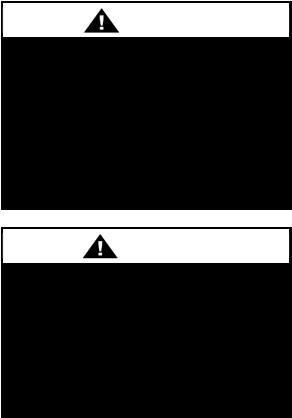
General Information
RQ Series packaged rooftop units, heat pumps and outdoor air handling units have been designed for outdoor installation only. Units are assembled, wired, charged and run tested at the factory.
Startup and service must be performed by a Factory Trained Service Technician.
WARNING
Improper installation, adjustment, alteration, service or maintenance can cause property damage, personal injury or loss of life. Startup and service must be performed by a
Factory Trained Service Technician.
A copy of this IOM should be kept with the unit.
CAUTION
These units must not be used for heating or cooling at any time during any phase of construction. Very low return air temperatures, harmful vapors, and misplacement of the filters will damage the unit and its efficiency.
Certification of Gas Heat Models
a.AAON gas heat exchangers have successfully completed 10,000 burner operation cycles and corrosion resistance as specified per test standard ANSI 21.47. All gas heat exchangers used in AAON appliances are certified for use downstream of evaporator or cooling coils.
b.Certified as a Category III forced air furnace with or without cooling.
20
c.Certified for outdoor installation only.
d.Certified for installation on a combustible roof with a minimum of 12” high curb.
Certification of Steam or Hot Water Heat Models
a.Certified as a forced air heating system with or without cooling.
b.Certified for outdoor installation only.
c.Certified for installation on a combustible roof with a minimum of 12” high curb.
Certification of Electric Heat Models
a.Certified as an electric warm air furnace with or without cooling.
b.Certified for outdoor installation only.
c.Certified for installation on a combustible roof with a minimum of 12” high curb.
Certification of Cooling Models
a.Certified as a commercial central air conditioner with or without electrically operated compressors.
b.Certified for outdoor installation only.
c.Certified for installation on a combustible roof with a minimum of 12” high curb.
d.Certified with refrigerant R-410A coils or with chilled water cooling coils.
Codes and Ordinances
RQ Series units have been tested and certified, by ETL, in accordance with UL Safety Standard 1995/CSA C22.2 No. 236, ANSI Safety Standard Z21.47b-2008/CSA 2.3b-2008, and ANSI Safety Standard Z83.8-2006/CSA 2.6-2006.
System should be sized in accordance with the American Society of Heating, Refrigeration and Air Conditioning Engineers Handbook.

Installation of RQ Series units must conform to the ICC standards of the International Mechanical Code, the International Building Code, and local building, plumbing and waste water codes. In the absence of local codes installation must conform to the current (United States) National Fuel Gas Code ANSI-Z223.1/NFPA 54 or the current (Canada) National Fuel & Propane Installation Code CSA B149.1 or B149.2, and Mechanical Refrigeration Code CSA B52. All appliances must be electrically grounded in accordance with local codes, or in the absence of local codes, the current National Electric Code, ANSI/NFPA 70 or the current Canadian Electrical Code CSA C22.1.
CAUTION
The Clean Air Act of 1990 bans the intentional venting of refrigerant as of July 1, 1992. Approved methods of recovery, recycling or reclaiming must be followed.
WARNING
Coils and sheet metal surfaces present sharp edges and care must be taken when working with equipment.
WARNING
Failure to observe the following instructions will result in premature failure of your system and possible voiding of the warranty.
Receiving Unit
When received, the unit should be checked for damage that might have occurred in
transit. If damage is found it should be noted on the carrier’s freight bill. A request for inspection by carrier’s agent should be made in writing at once. Nameplate should be checked to ensure the correct model sizes and voltages have been received to match the job requirements.
If repairs must be made to damaged goods, then the factory should be notified before any repair action is taken in order to protect the warranty. Certain equipment alteration, repair, and manipulation of equipment without the manufacturer’s consent may void the product warranty. Contact the AAON Warranty Department for assistance with handling damaged goods, repairs, and freight claims: (918) 583-2266.
Note: Upon receipt check shipment for items that ship loose such as filters and remote sensors. Consult order and shipment documentation to identify potential looseshipped items. Loose-shipped items may have been placed inside unit cabinet for security. Installers and owners should secure all doors with locks or nuts and bolts to prevent unauthorized access.
Figure 1 - Lockable Handle
The warranty card must be completed in full and returned to AAON not more than 3 months after unit is delivered.
21
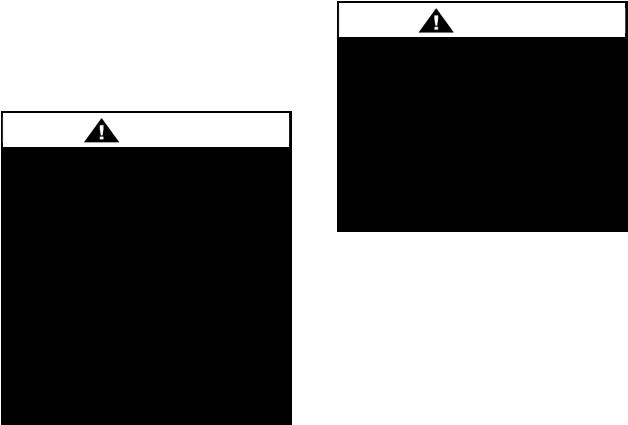
Storage
If installation will not occur immediately following delivery, store equipment in a dry protected area away from construction traffic and in the proper orientation as marked on the packaging with all internal packaging in place. Secure all loose-shipped items.
Packaged Direct Expansion (DX) Units
WARNING
COMPRESSOR CYCLING
5 MINUTE MINIMUM OFF TIME To prevent motor overheating compressors must cycle off for a minimum of 5 minutes.
5 MINUTE MINIMUM ON TIME To maintain the proper oil level compressors must cycle on for a minimum of 5 minutes.
The cycle rate must not exceed 6 starts per hour.
DX refrigeration system is factory assembled, leak tested, charged with refrigerant and run tested.
Refrigerant system includes an evaporator, condenser, liquid line filter drier, thermal expansion valve (TXV), and scroll compressor. Compressor is equipped with a positive pressure forced lubrication system.
Never cut off the main power supply to the unit, except for servicing, emergency, or complete shutdown of the unit. When power is cut off from the unit crankcase heater cannot prevent refrigerant migration into the compressor. This means the compressor will cool down and liquid refrigerant may accumulate in the compressor. The
22
compressor is designed to pump refrigerant gas and damage may occur when power is restored.
CAUTION
CRANKCASE HEATER
OPERATION
Some units are equipped with a compressor crankcase heater, which should be energized at least 24 hours prior to cooling operation, to clear any liquid refrigerant from the compressor.
If power to the unit must be off for more than an hour, turn the thermostat system switch to "OFF", or turn the unit off at the control panel, and leave the unit off until the main power switch has been turned on again for at least 24 hours for units with compressor crankcase heaters. This will give the crankcase heater time to clear any liquid accumulation out of the compressor before it is started.
Always control the unit from the thermostat, or control panel, never at the main power supply, except for servicing, emergency or complete shutdown of the unit.
During the cooling season, if the air flow is reduced due to dirty air filters or any other reason, the cooling coil can get too cold which will cause excessive liquid to return to the compressor. As the liquid concentration builds up, oil is washed out of the compressor, leaving it starved for lubrication.
The compressor life will be seriously shorted by reduced lubrication and the pumping of excessive amounts of liquid oil and refrigerant.
Note: Low Ambient Operation
Air-cooled DX units without a low ambient option, such as condenser fan cycling, ECM driven condenser fans or the 0°F low ambient option, will not operate in the cooling mode of operation properly when the outdoor temperature is below 55°F. Low ambient and/or economizer options are recommended if cooling operation below 55°F is expected.
Note: Multiple Units with Multiple Thermostats
When several heating and cooling units are used to condition a space all unit thermostat switches must be set in either heating mode, cooling mode or off. Do not leave part of the units switched to the opposite mode. Cooling only units should be switched off at the thermostat during the heating season.
Gas or Electric Heating
The unit is designed to heat a given amount of air while operating. If this amount of air is greatly reduced, approximately 1/3 during the heating season, the gas heat exchanger or
electric heating coil may overheat, and may cut the burner or heater off entirely by action of the safety high temperature limit devices which are factory mounted at the heat exchanger and supply fan areas.
Airflow should be adjusted after installation to obtain an air temperature rise within the range specified on the unit rating plate at the required external static pressure.
Should overheating occur with a gas heat exchanger, or the gas supply fail to shut off, shut off the manual gas valve to the furnace before shutting off the electrical supply.
Prolonged overheating of the heat exchanger will shorten its life.
If unit has not been selected as a 100% outside air unit (makeup air unit) the return air duct must be sealed to the unit and the return air temperature must be maintained between 55°F and 80°F.
|
Table 1 - Electric and Gas Heating Capacities |
||||||
|
Gas Heat |
|
|
|
Electric Heat |
||
Model |
Input Capacity |
Output Capacity |
|
|
|
Capacity |
|
Option B2 |
MBH |
|
MBH |
|
kW (208V) |
|
kW (230V, 380V , |
|
|
|
|
460V, 575V) |
|||
|
|
|
|
|
|
|
|
1 = Heat 1 |
60.0 |
|
48.6 |
7.5 |
|
10 |
|
2 = Heat 2 |
|
|
|
15.0 |
|
20 |
|
3 = Heat 3 |
100.0 |
|
81.0 |
22.5 |
|
30 |
|
4 = Heat 4 |
|
|
|
30.0 |
|
40 |
|
5 = Heat 5 |
140.0 |
|
113.4 |
|
|
|
|
6 = Heat 6 |
|
|
|
|
|
|
|
7 = Heat 7 |
160.0 |
|
129.6 |
|
|
|
|
23
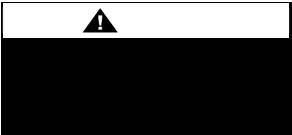
|
Table 2 - Auxiliary Electric Heating Capacities |
||
Feature 3 |
|
kW (208V) |
kW (230V, 380V 460V, |
|
|
|
575V) |
*K = Heat K |
|
7.5 |
10.0 |
*L = Heat L |
|
15.0 |
20.0 |
*M = Heat M |
|
22.5 |
30.0 |
*N = Heat N |
|
30.0 |
40.0 |
Wiring Diagrams
Unit specific wiring diagrams are laminated and affixed inside the compressor and control compartment door.
Condensate Drain Pan
Unit requires drain trap to be connected to the condensate drain pan of the unit. Units include one drain pan connection. Condensate drain pipes or p-trap is factory supplied and shipped loose in the control compartment for field installation.
If codes require a condensate drain line, the line should be the same pipe size or larger than the drain connection, include a p-trap, and pitch downward toward drain. An air break should be used with long runs of condensate lines.
CAUTION
Unit should not be operated without a p-trap. Failure to install a p-trap may result in overflow of condensate water.
24
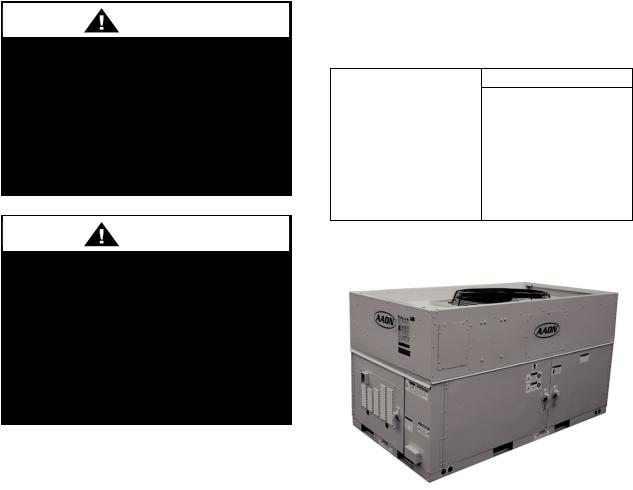
Installation
AAON equipment has been designed for quick and easy installation.
Unit Location
The curb should be mounted first and must be located so that duct connections will be clear of structural members of the building.
Verify rooftop or foundation can support the total unit weight, including accessory weights.
WARNING
When locating gas fired units, it is recommended the unit be installed so that the flue discharge vents are located at least 120 inches away from any opening through which combustion products could enter the building.
WARNING
Distances from adjacent public walkways, adjacent buildings, operable windows and building openings, shall conform to local codes and/or the National Fuel Gas
Code, ANSI Z223.1/NFPA 54, or the
National Gas & Propane Code, CSA B149.1
Do not position flue opening to discharge into a fresh air intake of any other piece of equipment. Unit should also be installed so that the flow of combustion intake air is not obstructed from reaching the furnace.
Vent opening must not be blocked by snow. A minimum 12” curb must be used or the
vent outlet shall be greater than 12” off the ground or roof.
Flue gas is dangerously hot and contains contaminants. The user is responsible for determining if vent gases may degrade building materials.
The National Gas and Propane Installation Code, B149.1 specifies a 6 ft. horizontal vent terminal clearance to gas and electric meters and relief devices.
Local codes may supersede or further place restrictions on vent termination locations.
Table 3 - Unit Clearances
Location Unit Size
2-6 tons
Front - |
36” |
|
(Heat Exchanger) |
||
|
||
Back - (Outside Air) |
36” |
|
Left Side |
24” |
|
Right Side |
48” |
|
Top |
Unobstructed |
Back
Front |
Right Side |
Figure 2 - RQ Series Orientation
Setting the Curb
Make openings in roof decking large enough to allow for duct penetration and workspace
25

only. Do not make openings larger than necessary. Set the curb to coincide with the openings. Make sure the curb is level. Unit must be level in both horizontal axes to support the unit and reduce noise and vibration.
CAUTION
All roofing work should be performed by competent roofing contractors to avoid any possible leakage.
CAUTION
Where the supply or warm air duct passes through a combustible roof, a clearance of 1 inch must be maintained between the outside edges of the duct and combustible material in accordance with National Fire Protection Association Standard No. 90A. Provide flashings or enclosure between structure and roof and all joints must be sealed with mastic roofing to ensure a watertight seal.
Be careful to install the provided gasket according to Figure 3 prior to setting the unit on the curb.
26
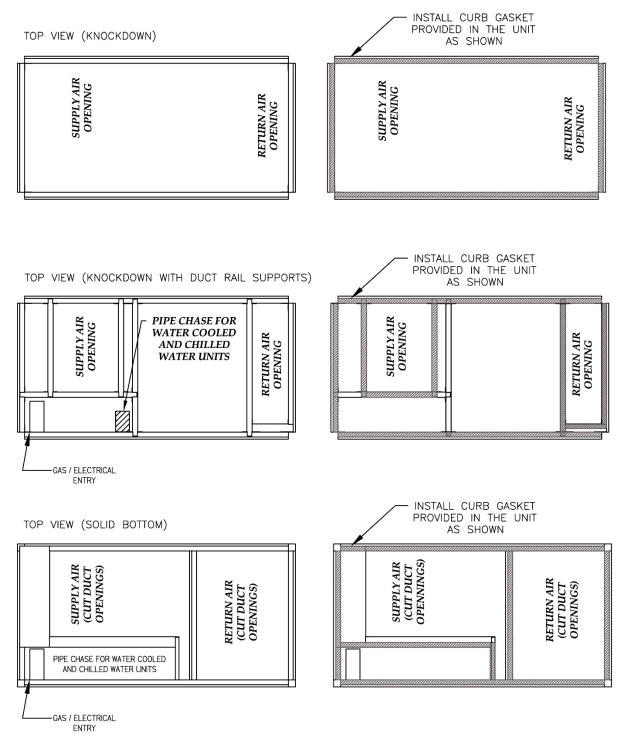
Figure 3 - RQ Cabinet Standard and Power Exhaust Gasket Locations
27
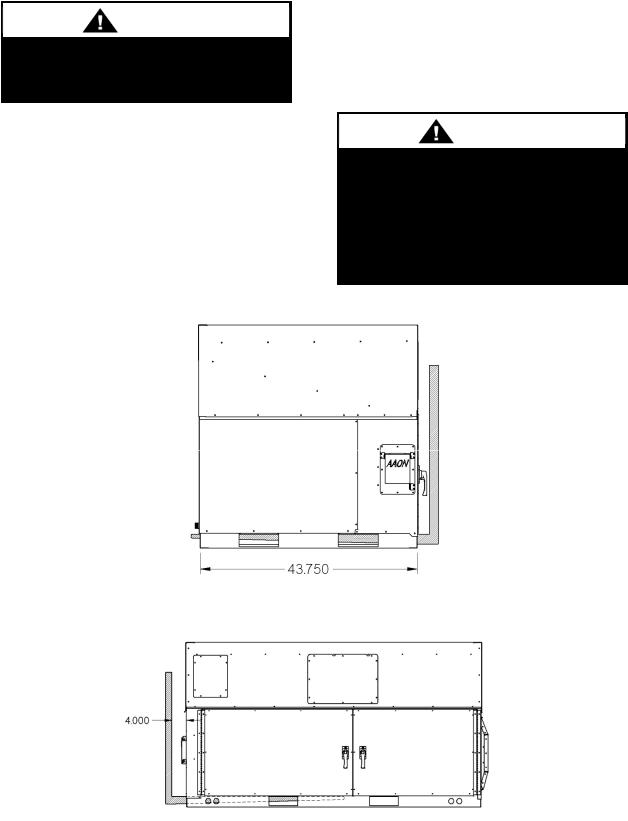
CAUTION
Incorrect lifting can cause damage to the unit.
Forklifting the Unit
Units can be lifted using a forklift. Forks must be 48” in length. Standard units can be lifted from all sides except the outside air side. Units with energy recovery wheels can only be fork lifted from the left or right side.
Forks must be perpendicular to unit. When lifting from either side, the forks must extend through to the opposite side of the
unit. When lifting from the end of the unit, the forks must extend at least 44” under the unit. When lifting with 48” forks, the back of the fork must be no more than 4” from the unit.
CAUTION
FORKLIFTING 2-6 TON UNITS
Forks or Fork Extensions must be at least 48” in length and must extend
44” under the unit.
 Forks
Forks
Figure 4 - Forklifting an RQ Series Unit from the Side
Figure 5 - Forklifting an RQ Series Unit from the Front
28
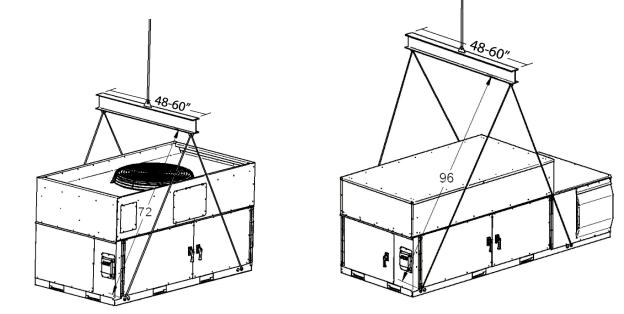
Lifting the Unit
The RQ Series units must be lifted using the lifting points in the side base rails. A spreader bar must be used to prevent the lifting straps from damaging the unit. The connection points on the spreader bar must be 48”-60” apart. The minimum cable length used to lift a standard length (82” base length) is 72”. The minimum cable length to lift energy recovery units (116” base length) is 96”. The shackles used to connect the cables to the lifting points in the base should be ½” nominal size.
The rigging must be adjusted to lift the unit level. Lifting the unit off-balance may cause severe damage.
It is recommended to lift the unit with the outside air hood in the downward shipping
Figure 6 - Lifting Details of a 2-6 ton Standard or Power Exhaust Unit
position. However, the unit may be lifted with the outside air hood in the open position.
Before lifting unit, be sure that all shipping material has been removed from unit. Secure hooks and cables at all lifting points provided on the unit.
Hoist unit to a point directly above the curb and duct openings. Be sure that the gasket material has been applied to curb.
Carefully lower and align the unit with utility and duct openings. Lower the unit until the unit skirt fits around the curb. Some units are designed to overhang the curb. Take care that any recessed base rails fit around the curb. Make sure the unit is properly seated on the curb and is level.
Figure 7 - Lifting Details of a 2-6 ton Energy Recovery Wheel Unit
29
